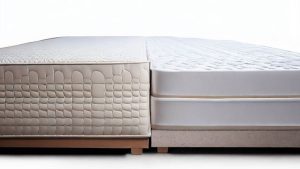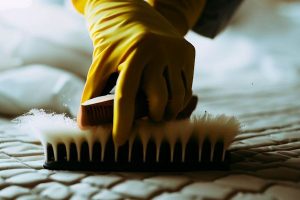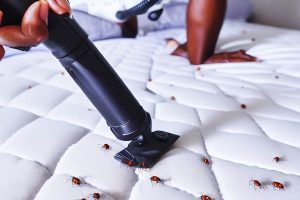As I lay in bed, I can almost feel the mattress-protecting cover wrapped around my mattress like a warm hug. Its soft, breathable material provides a layer of protection from spills and stains while keeping dust mites and other allergens at bay.
While there are many benefits to using a mattress protector, there are also some potential drawbacks that must be considered.
In this Nousdecor article, I explore the Pros And Cons Of Mattress Protector so you can make an informed decision about whether it is right for you.
Key Takeaways
- Mattress protectors provide a layer of protection for the mattress, guarding against dirt, spills, and wear-and-tear.
- They also protect against dust mites, bed bugs, and allergies, improving sleep quality and prolonging the lifespan of the mattress.
- However, mattress-protecting covers can reduce breathability, making the bed hot and uncomfortable, and may make home cleaning duties more difficult.
- When choosing a mattress protector, consider cost-effectiveness, natural materials for breathability, the right fit for comfort, and specific needs and preferences.

What is a Mattress Protector?
A mattress-protecting cover is a layer of protection you put on your mattress to protect it from dirt, spills, and wear-and-tear. It can be a great addition to any bed setup, from memory foam mattresses to best cooling mattresses or best memory foam mattresses.
A mattress protector generally consists of an extra fitted sheet that covers the entire surface of the mattress and helps guard against dust mites, bed bugs, and other allergies.
It’s important to know both the pros and cons of adding a mattress-protecting cover before making your decision. On one hand, they add an extra layer of comfort and provide more cushioning than just a fitted sheet alone.
On the other hand, if not cared for properly they can lead to build up over time which causes additional wear-and-tear on your mattress pad or mattress topper.
Moving forward, understanding what type of mattress protector is right for you is key in getting the most out of your sleep set up.
Types Of Mattress Protectors
Different types of mattress covers have their own advantages and disadvantages.
Mattress protectors are generally divided into fitted sheets, memory foam, cotton mattress, queen size, mattress encasement, and mattress toppers.
Fitted sheets offer a loose fit but do not provide protection on the sides; they can be easily put on and taken off.
Memory foam is comfortable and provides good protection from dust mites; however, it can’t be washed in hot water.
Cotton mattresses are breathable and allow air to circulate while providing a layer of cushioning for comfort; however, they may require frequent washing as dirt accumulates quickly.
Queen size mattress encasements offer superior protection against bedbugs but are difficult to take off when cleaning is needed.
Mattress toppers are great for adding extra cushioning but can make the bed too soft if used with a thicker pad or blanket beneath them.
Ultimately, choosing the best mattress-protecting cover depends on your individual needs—prioritizing comfort over durability or vice versa—so consider all the pros and cons before making your decision!
Pros And Cons Of Mattress Protector
As a mattress owner, I’m always looking for ways to protect my investment and keep it in good condition.
Mattress protectors offer a great way to do this, with both benefits and drawbacks worth considering.
From preventing spills and stains from damaging the mattress to potential health hazards due to heat retention, understand the pros and cons of investing in a mattress protector so you can make an informed decision.
Benefits Of Mattress Protector
I’m sure many of us can relate to the importance of a good night’s sleep. A mattress-protecting cover is an essential item for both comfort and hygiene.
It prevents bacteria, allergies, and liquids from entering your mattress. This not only prolongs the lifespan of your mattress but also makes cleaning easy. Additionally, it helps improve your sleep quality. Investing in a mattress protector is definitely worth considering!
Preventing Bacteria, Allergens, and Liquids
You can prevent bacteria, allergies, and liquids from getting into your mattress with a mattress-protecting cover. With options like the Prochill Waterproof Mattress Protector, you can protect any queen or king-size memory foam mattress from dust mites, pet dander, and other allergies.
Additionally, the waterproof barriers keep spills from seeping through, while the ultra-soft fabrics provide extra comfort. The hypoallergenic materials help improve air quality. By using a protector to guard against these common contaminants, you can take steps to extend the lifespan of your mattress.
Prolonging the Mattress Lifespan
By utilizing a mattress protector, you can prolong the lifespan of your mattress by protecting it from bacteria, allergies, and liquids.
- Mattress pads
- Fitted Mattress
- Casper Mattress
- Mainstays
- Quilted Mattress
- Best Bed
- Sleep Mattresses
From protecting against dust mites to keeping fluid spills at bay, a mattress-protecting cover is one way to protect your investment for years to come. Easily cleaning up messes without compromising comfort makes this choice almost too easy!

Easy To Clean
You’ll love how easy it is to clean up messes without compromising comfort! A mattress protector can help keep your bedding looking new and top-notch.
It’s also great for protecting against spills and other accidents that may occur. Plus, you’ll enjoy the added cooling benefits of many modern mattress-protecting covers products which are made from breathable materials like cotton and bamboo.
And, most mattress protectors are machine washable so you can quickly get your sheets and topper clean with minimal effort. Investing in a good quality mattress-protecting cover is an excellent way to extend the life of your bedding while improving sleep quality.
Improving Sleep Quality
Investing in a quality mattress-protecting cover can significantly improve sleep quality.
Mattress protectors provide a layer of protection from dust mites and other allergens, as well as stop split king mattress shifting throughout the night.
They also keep your foam mattress cool by providing better air circulation than traditional memory foam mattresses, and can even keep your air mattress warm outdoors.
If you invest in the best cooling or best memory foam types of mattresses, you’ll get all the benefits of a new mattress plus improved sleep quality with the added bonus of extra protection.
Drawbacks Of Mattress Protector
Using a mattress protector may have some drawbacks. It can reduce the breathability of your mattress, making it hot and uncomfortable.
Aside from that, there are also other issues to consider:
- Home cleaning duties may become more difficult due to the added layer of protection on top of the mattress.
- It’s important to read through the Terms of Service and Privacy Policy before purchasing any products related to mattress-protecting covers. Warranties or return policies could be affected by their use.
- Is a mattress protector necessary? Proper mattress protector cleaning frequency should be considered when exploring the benefits of using protectors for better sleep quality.
- In addition, exploring firm and plush mattress comfort options, keeping fitted sheets on air mattress, and addressing air mattress inflation problems can help you find your dream mattress!
All things considered, it’s best to weigh all pros and cons before deciding if a mattress-protecting cover is right for you. This transition will lead us into our next section about how to choose one!
How To Choose A Mattress Protector
Choosing the right mattress protector can be tricky, so it’s important to consider all your options.
Memory foam is often considered the best memory mattress protector, but it may not always be the most cost-effective.
Skip to content if you’re looking for a more affordable option that still offers good protection; cotton or polyester are good alternatives.
Another factor to think about is breathability: look for covers made of natural materials like wool and bamboo which offer excellent airflow.
It’s also important to choose one with the right fit – too tight and you’ll compromise comfort and movement; too loose and it won’t provide adequate protection.
With these considerations in mind, you’ll have no problem finding a mattress protector that meets both your needs and budget!

Care Instructions For Mattress Protectors
Caring for your mattress protector properly is key to ensuring its longevity. First, make sure that you follow the care instructions as outlined by the manufacturer. This may include machine washing it in cold water and air drying it or spot cleaning only.
Second, keep your mattress protector clean; remove and wash it regularly to prevent dust mites and dirt from building up over time.
Lastly, inspect your mattress protector regularly for any signs of wear and tear or damage; if you notice any problems, replace it right away.
Following these easy steps will help extend the life of your mattress protector so that you can get years of comfort out of it. With proper care, you’ll be able to enjoy a good night’s sleep without worrying about allergens or dust particles affecting your health!
Frequently Asked Questions
Conclusion
In conclusion, mattress protectors are a great way to keep your mattress in top condition for years to come. When choosing one, it’s important to consider breathability, durability, and size.
With the right protector, your mattress can be like a castle wall against spills and stains – strong and impenetrable. So weigh up the pros and cons of having a mattress protector before making your decision – it could make all the difference!






